人教新课标必修三:Unit3 The Million Pound Bank Note课件(76张ppt)
文档属性
| 名称 | 人教新课标必修三:Unit3 The Million Pound Bank Note课件(76张ppt) |
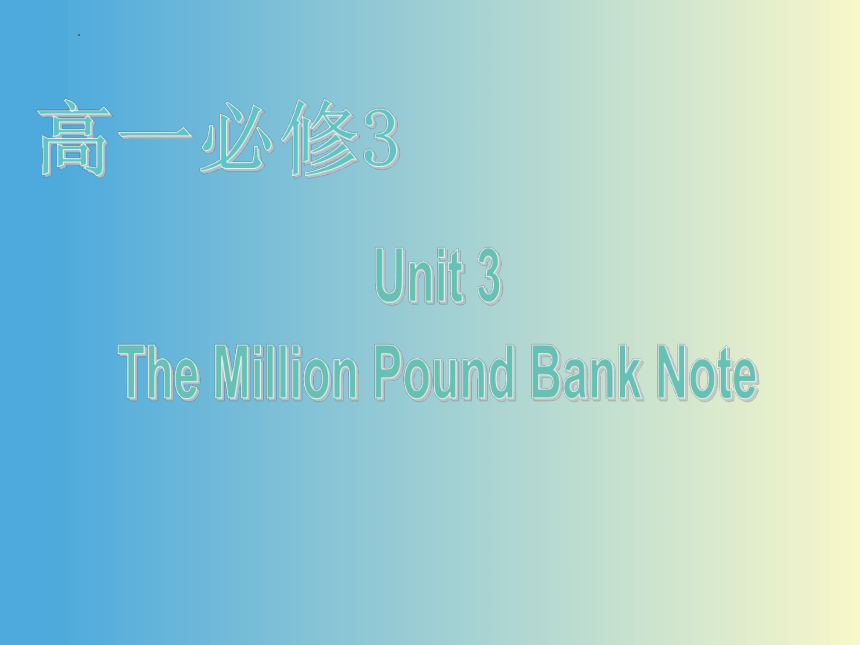
|
|
| 格式 | pptx | ||
| 文件大小 | 1014.8KB | ||
| 资源类型 | 教案 | ||
| 版本资源 | 人教版(新课程标准) | ||
| 科目 | 英语 | ||
| 更新时间 | 2022-02-28 00:00:00 | ||
图片预览

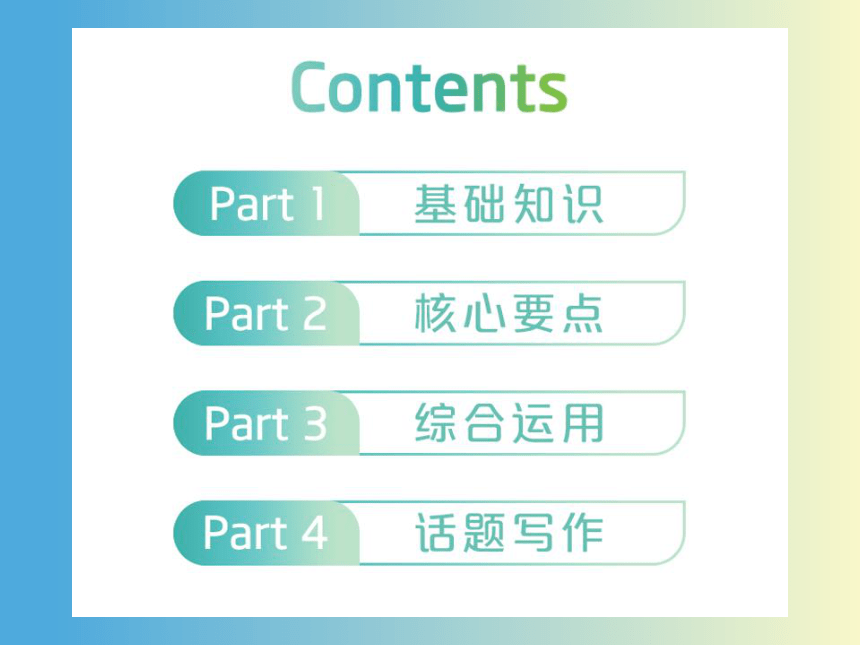
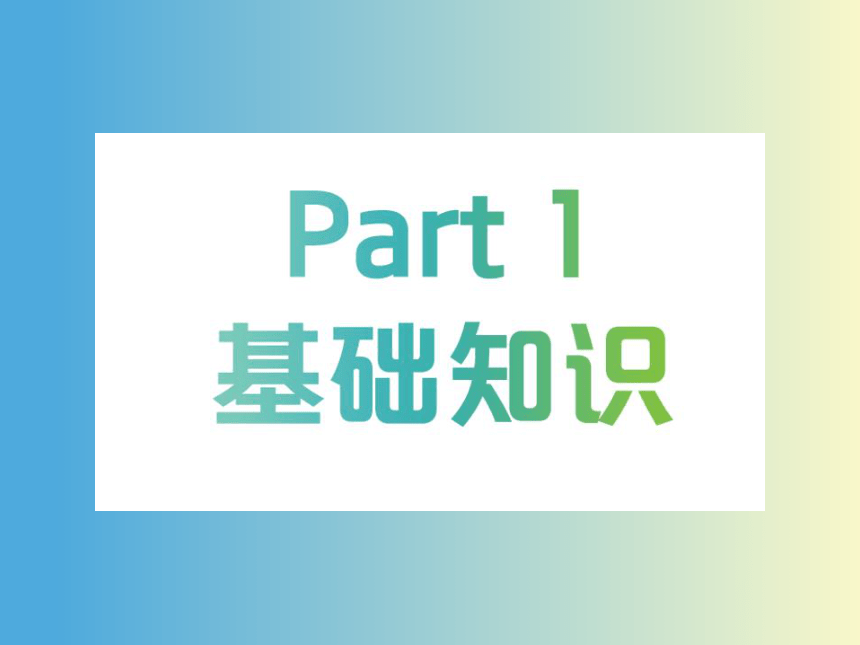

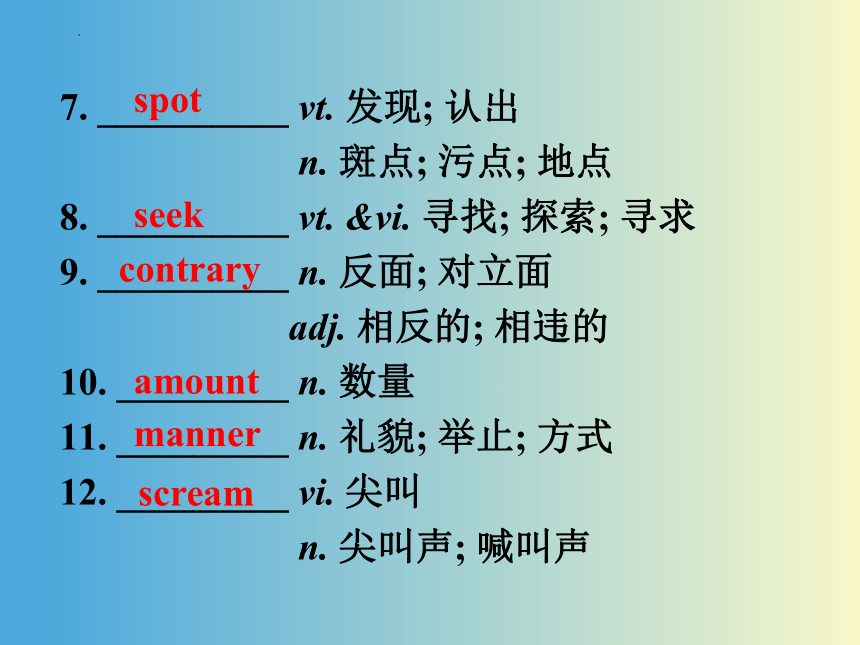
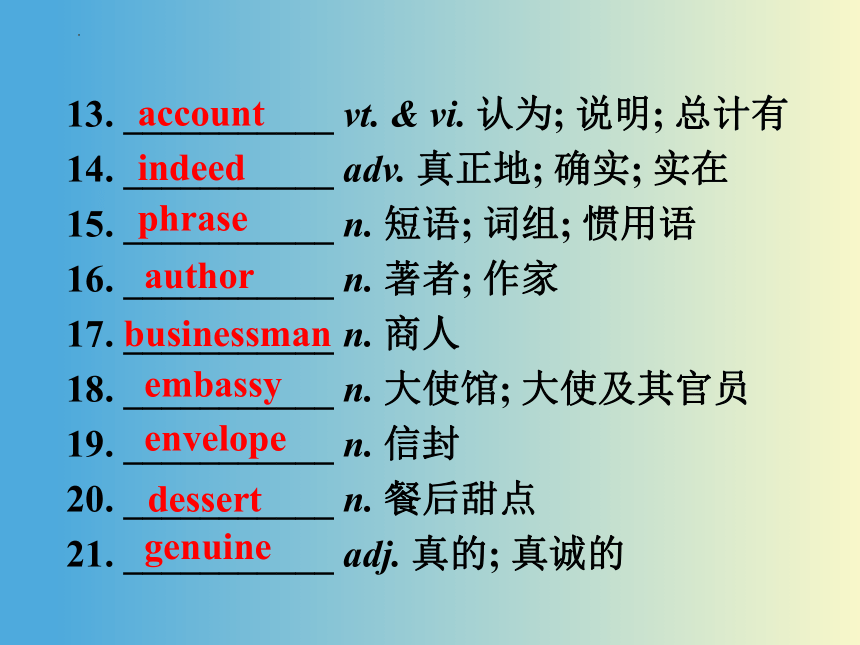
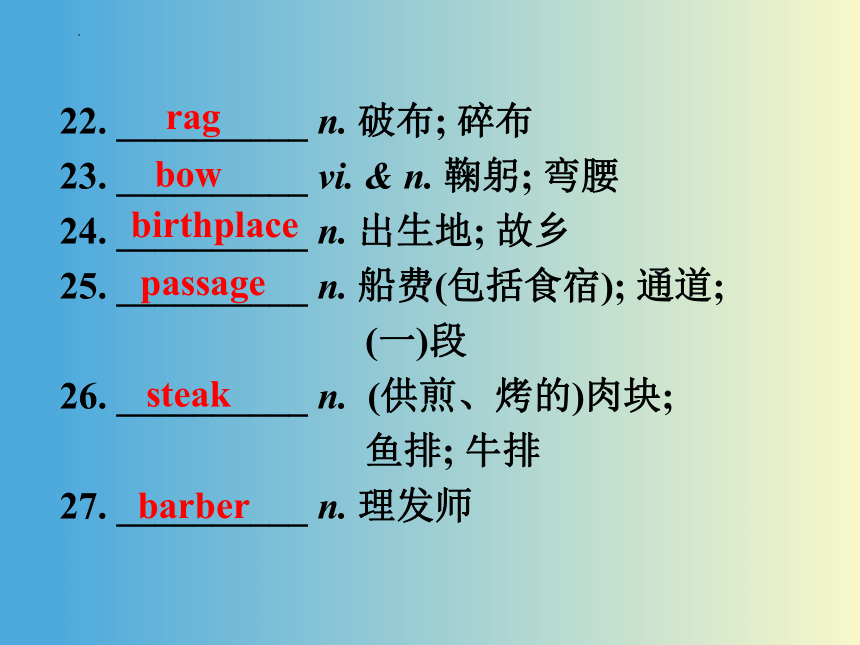
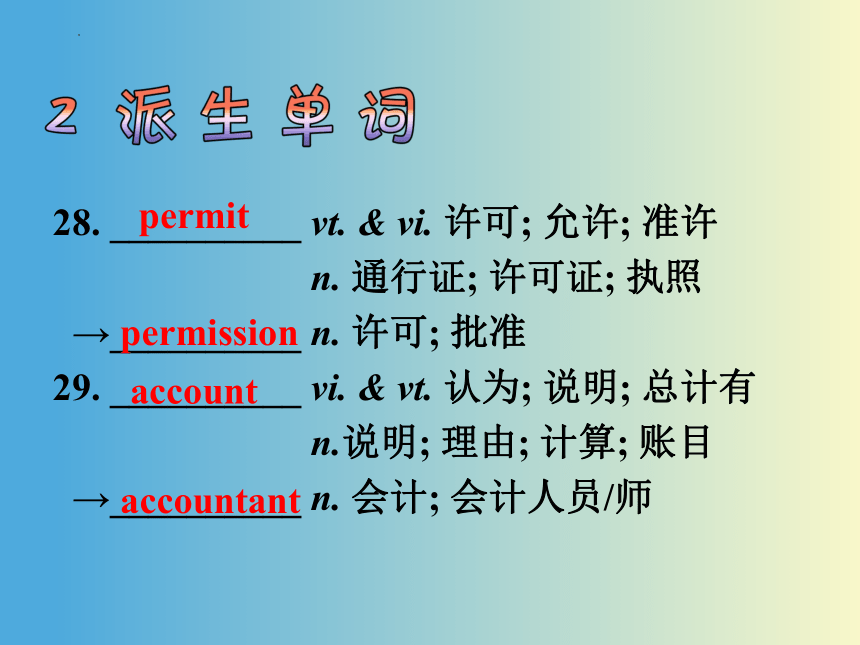
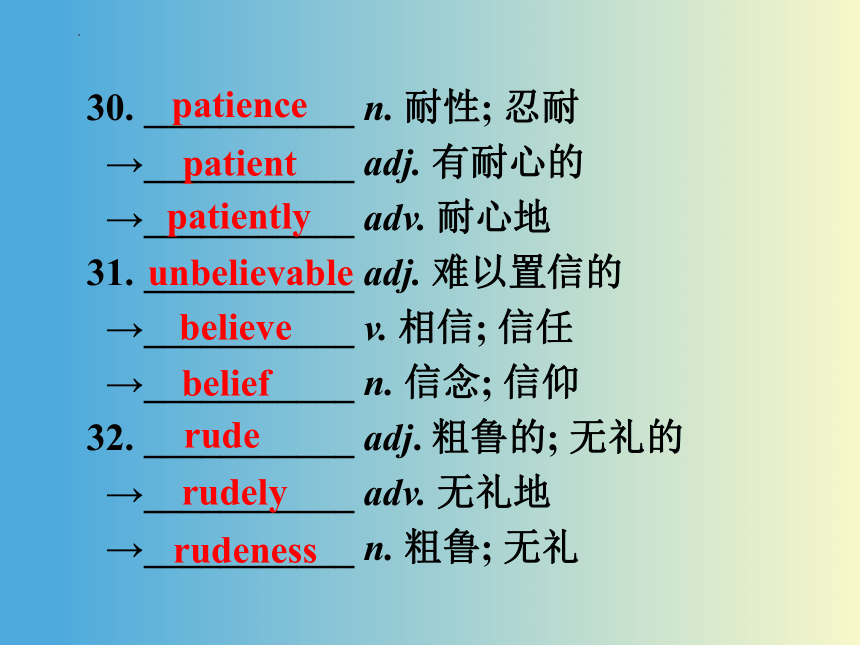
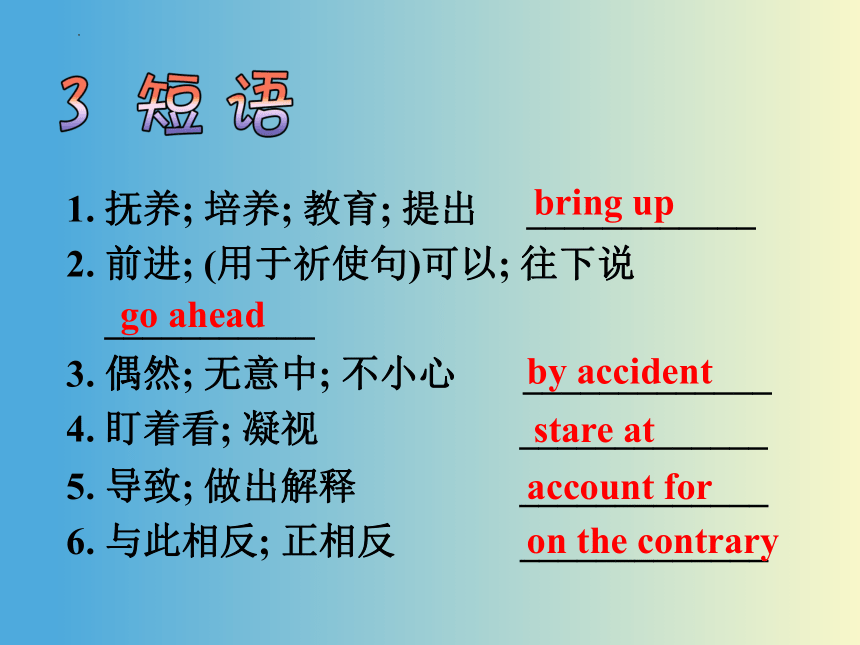
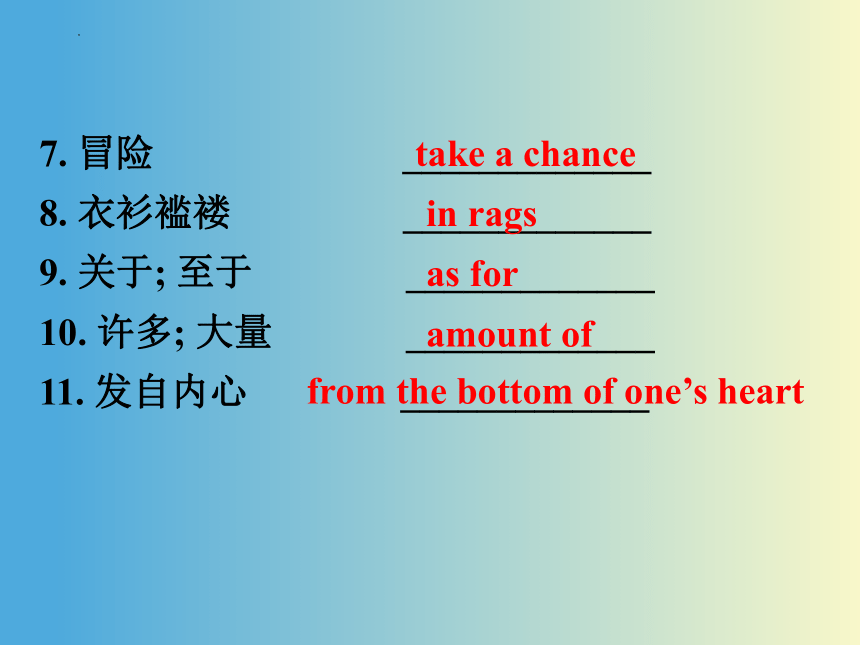
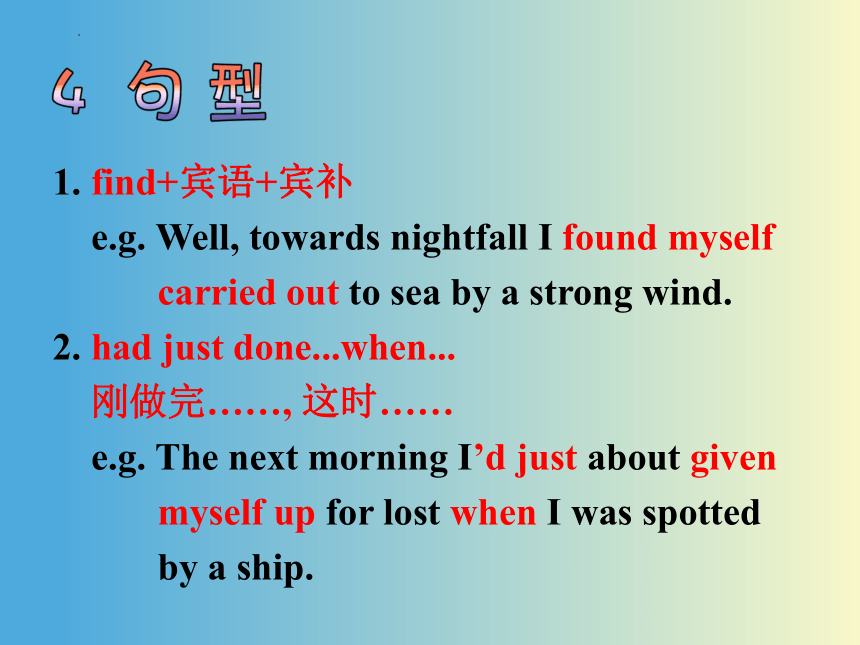
文档简介
(共76张PPT)
Unit 3
The Million Pound Bank Note
高一必修3
1. __________ n. 小说; 长篇故事
adj. 新奇的; 异常的
2. __________ n. 奇遇;冒险
3. __________ n. (戏剧)一场; 现场; 场面; 景色
4. __________ vi. 漫游; 漫步; 漂泊
5. __________ vi. 凝视; 盯着看
6. __________ n. 过错; 缺点; 故障
novel
adventure
scene
wander
stare
fault
7. __________ vt. 发现; 认出
n. 斑点; 污点; 地点
8. __________ vt. &vi. 寻找; 探索; 寻求
9. __________ n. 反面; 对立面
adj. 相反的; 相违的
10. _________ n. 数量
11. _________ n. 礼貌; 举止; 方式
12. _________ vi. 尖叫
n. 尖叫声; 喊叫声
spot
seek
contrary
amount
manner
scream
13. ___________ vt. & vi. 认为; 说明; 总计有
14. ___________ adv. 真正地; 确实; 实在
15. ___________ n. 短语; 词组; 惯用语
16. ___________ n. 著者; 作家
17. ___________ n. 商人
18. ___________ n. 大使馆; 大使及其官员
19. ___________ n. 信封
20. ___________ n. 餐后甜点
21. ___________ adj. 真的; 真诚的
account
indeed
phrase
author
businessman
embassy
envelope
dessert
genuine
22. __________ n. 破布; 碎布
23. __________ vi. & n. 鞠躬; 弯腰
24. __________ n. 出生地; 故乡
25. __________ n. 船费(包括食宿); 通道;
(一)段
26. __________ n. (供煎、烤的)肉块;
鱼排; 牛排
27. __________ n. 理发师
rag
bow
birthplace
passage
steak
barber
28. __________ vt. & vi. 许可; 允许; 准许
n. 通行证; 许可证; 执照
→__________ n. 许可; 批准
29. __________ vi. & vt. 认为; 说明; 总计有
n.说明; 理由; 计算; 账目
→__________ n. 会计; 会计人员/师
permit
permission
account
accountant
30. ___________ n. 耐性; 忍耐
→___________ adj. 有耐心的
→___________ adv. 耐心地
31. ___________ adj. 难以置信的
→___________ v. 相信; 信任
→___________ n. 信念; 信仰
32. ___________ adj. 粗鲁的; 无礼的
→___________ adv. 无礼地
→___________ n. 粗鲁; 无礼
patience
patient
patiently
unbelievable
believe
belief
rude
rudely
rudeness
1. 抚养; 培养; 教育; 提出 ____________
2. 前进; (用于祈使句)可以; 往下说
___________
3. 偶然; 无意中; 不小心 _____________
4. 盯着看; 凝视 _____________
bring up
go ahead
by accident
stare at
5. 导致; 做出解释 _____________
6. 与此相反; 正相反 _____________
account for
on the contrary
7. 冒险 _____________
8. 衣衫褴褛 _____________
9. 关于; 至于 _____________
10. 许多; 大量 _____________
11. 发自内心 _____________
take a chance
in rags
as for
amount of
from the bottom of one’s heart
1. find+宾语+宾补
e.g. Well, towards nightfall I found myself
carried out to sea by a strong wind.
2. had just done...when...
刚做完……, 这时……
e.g. The next morning I’d just about given
myself up for lost when I was spotted
by a ship.
1. un-常用于形容词前构成反义词
① un+ believable→unbelievable 难以置信的
② un+ happy→unhappy 不幸福的
③ un+ kind→unkind 不友善的
④ un+ fit→unfit 不健康的
⑤ un+ comfortable→uncomfortable 不舒适的
2. “take a(n) + n.” 一览
① take a chance 冒险
② take a break 休息一下
③ take a seat 就座
④ take a shower 淋浴; 洗澡
⑤ take an exam 参加考试
⑥ take an example 举例; 示范
⑦ take a nap 小睡一会儿
⑧ take a photo 拍照
与文学或艺术相关的语块
stage art 舞台艺术
modern art 现代艺术
artistic creation 艺术创造
artistic appreciation 艺术鉴赏力
art form 艺术形式
background music 背景音乐
fairy tale 童话故事
science fiction 科幻小说
detective story 侦探故事
comedy show 喜剧表演
appeal of theatre 戏剧的感染力
show reality 表现现实
brief summary of the novel 小说梗概
talk show 脱口秀
historical drama 历史剧
deal with the theme of the story in a very clever manner 用非常高明的方法体现故事主题
perfect harmony between mind and hand
思想和手法完美结合
Time is fleeting, and art is long.
时光飞逝,艺术永恒。
Wisdom is required both in appreciating great artistic works and in understanding great scientific concepts.
伟大艺术的美学鉴赏和伟大科学观念的理解都需要智慧。
While artistry, form and genre are the flesh and bones of an art, emotions are its soul.
技巧、形式和流派只是艺术的骨肉,而情感才是艺术的灵魂。
1. scene n. (戏剧)一场; 现场; 场面;
景色; (电影, 电视)一个镜头
【教材原句】
Act I, Scene 3 第一幕, 第3场
【归纳】
on the scene 在现场; 当场
appear/come on the scene 出场; 登场
behind the scenes 在幕后; 暗中
the scene of the accident 事故现场
set the scene 为……做好准备
【拓展】
scenery n. 风景; 景色
【点津】
scene有“场景; 场面; 地点”的含义, 后接定语从句且关系词在定语从句中作状语时, 一般用关系副词where或in which。在定语从句中, 有类似用法的名词还有condition, situation, point, state, case, stage等。
1) The colors of the brown rocks, the deep green pine trees, and the late afternoon sun mixed to create a magic _______ (scene).
2) Many people who had seen the film were afraid to go to the forest when they remembered the scenes ________ people were eaten by the tiger.
3) This attractive tour takes you to some of San Francisco’s most cheerful holiday _______ (scene).
【语境应用】单句填空。
scene
where
scenes
【教材原句】
Permit me to lead the way, sir.
先生,请让我来带路吧。
2. permit v. 允许; 容许; 许可
n. 许可证; 执照; 通行证
【归纳】
permit sb. to do sth. 允许某人做某事
permit doing sth. 允许做某事
permit of 容许(常用于否定句)
【拓展】
permission n. 允许; 许可
with/ without permission 获得/未经允许
ask for permission 请求允许
【语境应用】单句填空。
1) Employees are permitted ___________ (use) the golf course during their free hours.
2) The visitors are reminded that the museum doesn’t permit ____________ (smoke).
3) You should know that no photos are to be taken of the exhibits without ____________ (permit).
to use
smoking
permission
【点津】
Time permitting, my sister and I will see the
film this evening.
permit用作不及物动词, 意为“允许”, 此时常用于动词-ing形式的独立主格结构中, 相当于if引导的条件状语从句。
Time permitting = if time permits
【教材原句】
The next morning I’d just about given myself up for lost when I was spotted by a ship.
第二天早上, 我正感到绝望的时候, 一艘船发现了我。
3. spot vt. 发现; 认出; 点缀
n. 斑点; 污点; 地点
【归纳】
spot sb. doing sth. 看到某人正在做某事
be spotted with... 满是……的斑点; 点缀着
on the spot 当场; 在现场; 立即
【语境应用】单词拼写。
She said she ________(发现) my wallet on a bus seat. (2019 天津)
spotted
写出下列句子中spot的词性及含义。
1) After spotting a wallet on the front seat inside a parked car with its window down, he stood guard in the rain for about two hours waiting for the owner to return. ________
2) I’m going to find a spot for us to camp. _______
3) She has a white dress with blue spots. _______
4) The night sky was spotted with stars. _______
v. 发现
n. 地点
v. 点缀
n. 斑点
【教材原句】
The fact is that I earned my passage by working as an unpaid hand, which accounts for my appearance.
事实上我靠做义工来顶替船费,这就是我为什么衣冠不整的原因了。
4. account vi. & vt. 认为; 说明; 总计有
n. 说明; 理由; 计算; 账目; 报道
【归纳】
account for 解释; 是……的原因; 占……(比
例)
on account of 由于; 因为
on no account 决不
take account of …./take … into account
考虑到……
【拓展】
表示否定意义的短语on no account置于句首时, 句子使用部分倒装, 类似的短语还有:
at no tome; in no case/way; on no condition; by no means; under no circumstances。
【语境应用】完成句子。
1) She ______ ______ _________ (描述) of what she saw in China.
2) The plane didn’t take off on time ______ _______ ______ (因为) the bad weather.
3) ______ ______ _______ (决不) will you miss the chance.
4) The student was unable to _______ _______ (说明) his absence from class.
on
account of
On no account
account for
gave an account
【教材原句】
I went to the American embassy to seek help, but …
我上美国大使馆求助,但是….
5. seek vt. & vi. 试图, 设法; 征询,寻求;
探索, 探寻
【归纳】
seek to do sth. 试图做某事
seek after/for… 寻找/追求……
seek out 挑选; 找出
seek one’s fortune 寻找发财机会; 碰运气
【拓展】
表示寻找的短语还有: look for, search for,
hunt for等。
1) She managed to calm him down and __________________________ (向一位邻居求助).
2) Everyone has the right to __________
___________ (追求幸福).
3) The little boy ______________ (正在试图) make up with his elder sister.
4) Our group was asked to ________(探索) out an interaction with its waiter; the other, to speak only when necessary. (2018 全国卷Ⅱ)
【语境应用】完成句子。
seek help from a neighbour
happiness
seek (for)
is seeking to
seek
【教材原句】
He was brought up in Hannibal, Missouri, along the Mississippi River.
他成长在汉尼拔密苏里州,挨着密西西比河。
1. bring up 抚养; 培养; 养育; 教育;
提出; 呕吐
【拓展】
bring about 引起; 导致; 造成
bring back 带回某物; 使想起某事
bring down 降低; 击败
bring in 引入; 赚(钱)
bring out 使显现出; 出版; 生产
1) Mrs. White brought up five children.
2) Born into a family with three brothers,
David was brought up to value the sense
of sharing.
3) Bring up the wine and you will feel
better.
4) They are so creative that they can always
bring up good ideas.
【语境应用】写出下列各句中bring up的含义。
抚养
提出
教育
呕吐
【教材原句】
Well, we’ll have to take a chance.
嗯, 那我们不得不冒险试一试。
2. take a chance 冒险
(= take one’s chances/ take chances)
【归纳】
take one’s chance 碰运气
have a chance of doing/to do sth.
有机会做某事
a chance of sth. ……的机会
by chance/accident 偶然; 碰巧
(the) chances are (that) … 有可能……
There is a chance that … 可能……
chance to do… 碰巧做……
【语境应用】完成句子。
1) Since there was no way out, the robber decided __________ (take) a chance on his luck to see if he could run away.
2) __________ chance/accident, he found the place where his brother had hidden the treasure.
3) The player is under good treatment and the chances are ___________ he will recover from his injury in time for the next game.
to take
By
that
1. Well, towards nightfall I found myself carried out to sea by a strong wind.
【教材原句】嗯, 傍晚时分我发现自己被一阵大风刮到海上去了。
【归纳】
find后接复合宾语, carried out为过去分词短语, 在句中作宾语补足语, 表被动。
find的复合宾语结构如下:
find + 宾语 +
现在分词: 表示主动、进行
过去分词: 表示被动、完成
形容词
介词短语
1) When he came back, I found a bunch of flowers ________ his hand.
当他回来的时候, 我发现他手里拿着一束花。
2) Even the best writers sometimes find themselves ________ (lose) for words.
即使是最好的作家有时候也会发现自己表达不出来。
3) Dick found himself ___________ (walk) in the direction of Mike’s home.
迪克发现自己正朝迈克家的方向走去。
【语境应用】完成句子。
in
lost
walking
2. The next morning I’d just about given myself up for lost when I was spotted by a ship.
【教材原句】第二天早上, 我正感到绝望的时候,一艘船发现了我。
when作并列连词时, 相当于and then或and just at that time, 往往表示一件事正在发生, 即将发生或刚刚完成, 而就在那时又发生了另一件事。常带有“突然”之意, 可译为“正要……, 突然……”,“正在……, 这时……”或“刚刚……, 这时……”。
had just done... when... 刚做完某事, 这
时……
be doing... when... 正在做……这时……
be about to do... when... 正要做……这
时……
be on the point of doing... when...
正要做……这时……
【归纳】
1) Jack was working in the lab the
power cut occurred.
停电时, 杰克正在实验室工作。
2) I was give up my father came and encouraged me to keep going.
我正要放弃时, 父亲过来鼓励我继续下去。
3) I my homework when all the lights went out.
我刚做完作业, 灯就全灭了。
【语境应用】完成句子。
when
about to when
had just finished
1. 宾语从句要点归纳
1) 当宾语从句后有宾语补足语时, 需要用it作形式宾语, 而将宾语从句后置。
e.g. I remember I made it quite clear to you
that I was not coming.
2) 当主句的主语是第一人称, 且谓语为think, believe, suppose, expect等动词时, 如果宾语从句表示否定意思, 通常否定前移, 即否定主句的谓语。
e.g. I don’t think I can ever forgive him.
I don’t believe they’ve finished their
work yet.
3) 宾语从句亦可用作介词或形容词的宾语。
e.g. She was never satisfied with what she
had achieved.
I’m not sure whether my dream will
come true.
4) 宾语从句的引导词that在口语中可省略,但在下列情况中,that需保留:
a. 主、从句之间有表示时间等的状语时that不能省略,否则会产生歧义。
e.g. She said last night that she did some
reading.
b. 主、从句之间有插入语时不可省去that。
e.g. I don’t doubt, in any case, that our
school team will win the match.
c. 引导两个或两个以上的宾语从句时,第二个以及第二个以后的宾语从句中的that不能省略。
e.g. He said he couldn’t tell you right away
and that you wouldn’t understand.
2. 表语从句要点归纳
1) 当主语是reason, 且后面的表语从句表示原因时通常用that引导; 而当it, this或that作主语, 后面的表语从句表示原因时, 常用because或why引导。
e.g. The reason was that I missed the bus.
This is because the earth is travelling
round the sun.
That’s why we decided to put the
meeting off.
2) 表语从句还可由as if/as though等引导。
as if/as though引导表语从句时, 主句中的动词可用be, seem, appear, look, taste, sound, feel等。
e.g. It looks as if it is going to rain.
This meat tastes as if it has already gone
bad.
【语境应用】用适当的连接词填空。
Our teacher always encouraged us to try to guess 1. ________ new words and phrases meant because it was unlikely 2. ________ we would always be able to use our dictionaries. It was good advice, but I was very aware of (知
道) 3. ________ wrong my guesses could be sometimes. For example, I once guessed
4. ________ the phrase “kick the bucket” must mean that you are very happy and you show you are happy by kicking a bucket.
what
that
how
that
So, I was rather surprised when I discovered that it meant the same as “die”. I was really glad 5. ________ I hadn't tried to use the phrase. I would have been so embarrassed (尴尬的) by 6. ________ people would have thought if they had told me 7. ________ they had good news, I would have said, “Great! Now you'll kick the bucket!” They would have been totally amazed by 8. ________ I had said.
that
what
that
what
Sailing home, Henry, 1. ______ American businessman, found himself 2. __________ (carry) out to sea by a strong wind. He was just about to give himself up when he was
3. _________ (spot) by a ship and so he landed in London by accident. Hungry and tired, he was walking on the streets of the city when he was 4. ___________ (expect) called into a mansion, 5. ________ two rich brothers, Oliver and Roderick, gave him a letter and told him not to open it until two o’clock of the day.
I. 课文语法填空。
an
carried
unexpectedly
where
spotted
Not 6. ________ (know) it was a million pound bank note, Henry left the mansion and went into a cheap restaurant to stuff his stomach. Everybody 7. _________ (be) rude to him because he was in rags and looked 8. _________ (depress). Then, to the surprise of everybody, he handed the owner a million pound bank note to pay for the meal. 9. _________(see) the note, all the people in the restaurant became polite and tried 10. _________ (them) best to please Henry. Don’t you think it’s the most incredible tale in the world
Seeing
depressed
their
was
knowing
II. 课文短文改错。
∧
his
would
eating
∧
the
With the envelope in hand, Henry decided
to enter a restaurant for a meal. The waiter
told him the meal will cost him much money.
After eat his food, Henry asked for more of
the same. When Henry opened the letter, he
was surprised to find it was a million pound
bank note and the owner and waiter were
shocked. They couldn’t believe Henry who
was of rags could be so rich. After
knowing that the bill is genuine, the owner
thanked for Henry and asked him to forget
the bill. The owner, the hostess and the
waiter all bowed while Henry left.
in
was
when/as
III. 用本单元所学词汇和句式结构完成句子。
1. 他偶然发现了他弟弟藏宝的地方。
By accident, he found the place where his brother had hidden the treasure.
2. 事实上我靠做义工来顶替船费,这就是我为什么衣冠不整的原因了。
The fact is that I earned my passage by working as an unpaid hand, which accounts for my appearance.
3. 这个话题我不觉得乏味,正相反,我觉得它很有趣。
The topic doesn’t seem boring to me; on the contrary, I think it’s very interesting.
4. 她的父母在她还是个婴儿的时候就去世了, 她由她的阿姨抚养长大
Her parents died when she was a baby and she was brought up by her aunt.
5. 至于我,我再也不来这个餐馆了。
As for me, I shall never come to this restaurant any more.
如何写英文短剧
【写作任务】
假设你是李华,你校英文报正在组织英语戏剧剧本创作大赛,请根据课文内容续写一段
《百万英镑》的剧本,参加该比赛。
注意:1. 词数250 左右;
2. 开头已给出,但不计入总词数。
Act I, Scene 5
NARRATOR: Henry smiles as he leaves the
restaurant. When he is walking down the street, he sees a sign for a barber's shop. In a shop window, he looks at his own hair. Since it is too long, he decides to get it cut.
HENRY: Good afternoon, I'd like to get a cut, if I may.
BARBER:______________________________________________________________
【写作指导】
一、审题定调
本写作任务要求写一段英文剧本。剧本是一
种文学形式,主要由台词和舞台说明组成。其中,舞台说明是以剧作者的口气来写的叙述性的文字说明,包括剧中人物、剧情发生的时间及地点、服装、道具、布景以及人物的表情、动作、上下场等。
写英语短剧时,注意以下几点:
1. 故事情节的构成主要有以下几部分:
背景:交代故事中的人物、时间和地点等方面的信息。
问题或冲突:人物之间存在的正反两种力量的较量。
高潮:人物之间直接面对矛盾,使剧情达到高潮。
结局:解决矛盾及消除障碍,结束冲突。
2. 写英语短剧,尽量使用简洁的语言,要让读者及观众在很短的时间内明白短剧所要表达的内容,因此剧情描写不要有太多的细节。
3. 短剧不像小说,对人物的性格有大段的描
写,剧本中人物的刻画主要通过对话实现,所以人物个性要鲜明。
4. 如剧情需要,可分幕(Act)和场景
(Scene)。幕之下分成许多小的场景。
二、谋篇布局
本篇写作主要描述亨利在离开饭店之后,带着
100 万英镑的钞票去理发店发生的事情。我们可将该剧本分成以下几部分来写:
1. 背景:交代故事中的人物、地点和背景等方面的信息(已给出)。
2. 问题或冲突:理发师担心亨利是否能够担负得起高昂的费用。
3. 高潮:理发结束后,亨利拿出了百万英镑的钞票。
4. 结局:理发师惊讶万分,告诉他随时光临。
【范文展示】
Act I, Scene 5
NARRATOR: Henry smiles as he leaves the
restaurant. When he is walking down the street, he sees a sign for a barber's shop. In a shop window, he looks at his own hair. Since it is too long, he decides to get it cut.
HENRY: Good afternoon, I'd like to get a cut, if I may.
BARBER: (looking Henry up and down) Yes, I can see that. Indeed, I can. But can't you see that I'm busy
HENRY: Well, I'll just have a seat then.
NARRATOR: After some time, the barber finishes cutting the other man's hair, takes his money, and then turns to look at Henry.
BARBER: (looking at Henry coldly) You know, it's very expensive here. Are you sure you want to get your cut here
HENRY: Yes, I think so. (looking at some pictures of the latest hairstyle) Which one do you think suits me
BARBER: Suits you (pointing at one) This one, I think. It is the cheapest one.
HENRY: Well, it's good! But ..., I like that one
better.
BARBER: (impatient) Sir, I'm afraid that one will cost a large amount of money.
HENRY: I understand. But I'll have that one.
BARBER: (answering unwillingly) OK.
NARRATOR: They both become quiet. After his hair is cut, the barber tells Henry how much money he must pay.
HENRY: Then, the bill! (handing the million pound bank note to the barber)
BARBER: (staring at the note with his mouth half open) Oh, my goodness. It can't be! Why, Mr. ...
HENRY: Adams. Henry Adams. I'm sorry, but I don't have any small bills.
BARBER: (wearing a big smile) Nothing to worry about! You can come whenever you want. And you can enjoy the best service for free whenever you come.
HENRY: Uh ..., it's unbelievable. (murmuring)
That's very kind of you!
BARBER: It's my great honour to serve you, sir! (He bows and waves his hand wildly as Henry leaves.)
Unit 3
The Million Pound Bank Note
高一必修3
1. __________ n. 小说; 长篇故事
adj. 新奇的; 异常的
2. __________ n. 奇遇;冒险
3. __________ n. (戏剧)一场; 现场; 场面; 景色
4. __________ vi. 漫游; 漫步; 漂泊
5. __________ vi. 凝视; 盯着看
6. __________ n. 过错; 缺点; 故障
novel
adventure
scene
wander
stare
fault
7. __________ vt. 发现; 认出
n. 斑点; 污点; 地点
8. __________ vt. &vi. 寻找; 探索; 寻求
9. __________ n. 反面; 对立面
adj. 相反的; 相违的
10. _________ n. 数量
11. _________ n. 礼貌; 举止; 方式
12. _________ vi. 尖叫
n. 尖叫声; 喊叫声
spot
seek
contrary
amount
manner
scream
13. ___________ vt. & vi. 认为; 说明; 总计有
14. ___________ adv. 真正地; 确实; 实在
15. ___________ n. 短语; 词组; 惯用语
16. ___________ n. 著者; 作家
17. ___________ n. 商人
18. ___________ n. 大使馆; 大使及其官员
19. ___________ n. 信封
20. ___________ n. 餐后甜点
21. ___________ adj. 真的; 真诚的
account
indeed
phrase
author
businessman
embassy
envelope
dessert
genuine
22. __________ n. 破布; 碎布
23. __________ vi. & n. 鞠躬; 弯腰
24. __________ n. 出生地; 故乡
25. __________ n. 船费(包括食宿); 通道;
(一)段
26. __________ n. (供煎、烤的)肉块;
鱼排; 牛排
27. __________ n. 理发师
rag
bow
birthplace
passage
steak
barber
28. __________ vt. & vi. 许可; 允许; 准许
n. 通行证; 许可证; 执照
→__________ n. 许可; 批准
29. __________ vi. & vt. 认为; 说明; 总计有
n.说明; 理由; 计算; 账目
→__________ n. 会计; 会计人员/师
permit
permission
account
accountant
30. ___________ n. 耐性; 忍耐
→___________ adj. 有耐心的
→___________ adv. 耐心地
31. ___________ adj. 难以置信的
→___________ v. 相信; 信任
→___________ n. 信念; 信仰
32. ___________ adj. 粗鲁的; 无礼的
→___________ adv. 无礼地
→___________ n. 粗鲁; 无礼
patience
patient
patiently
unbelievable
believe
belief
rude
rudely
rudeness
1. 抚养; 培养; 教育; 提出 ____________
2. 前进; (用于祈使句)可以; 往下说
___________
3. 偶然; 无意中; 不小心 _____________
4. 盯着看; 凝视 _____________
bring up
go ahead
by accident
stare at
5. 导致; 做出解释 _____________
6. 与此相反; 正相反 _____________
account for
on the contrary
7. 冒险 _____________
8. 衣衫褴褛 _____________
9. 关于; 至于 _____________
10. 许多; 大量 _____________
11. 发自内心 _____________
take a chance
in rags
as for
amount of
from the bottom of one’s heart
1. find+宾语+宾补
e.g. Well, towards nightfall I found myself
carried out to sea by a strong wind.
2. had just done...when...
刚做完……, 这时……
e.g. The next morning I’d just about given
myself up for lost when I was spotted
by a ship.
1. un-常用于形容词前构成反义词
① un+ believable→unbelievable 难以置信的
② un+ happy→unhappy 不幸福的
③ un+ kind→unkind 不友善的
④ un+ fit→unfit 不健康的
⑤ un+ comfortable→uncomfortable 不舒适的
2. “take a(n) + n.” 一览
① take a chance 冒险
② take a break 休息一下
③ take a seat 就座
④ take a shower 淋浴; 洗澡
⑤ take an exam 参加考试
⑥ take an example 举例; 示范
⑦ take a nap 小睡一会儿
⑧ take a photo 拍照
与文学或艺术相关的语块
stage art 舞台艺术
modern art 现代艺术
artistic creation 艺术创造
artistic appreciation 艺术鉴赏力
art form 艺术形式
background music 背景音乐
fairy tale 童话故事
science fiction 科幻小说
detective story 侦探故事
comedy show 喜剧表演
appeal of theatre 戏剧的感染力
show reality 表现现实
brief summary of the novel 小说梗概
talk show 脱口秀
historical drama 历史剧
deal with the theme of the story in a very clever manner 用非常高明的方法体现故事主题
perfect harmony between mind and hand
思想和手法完美结合
Time is fleeting, and art is long.
时光飞逝,艺术永恒。
Wisdom is required both in appreciating great artistic works and in understanding great scientific concepts.
伟大艺术的美学鉴赏和伟大科学观念的理解都需要智慧。
While artistry, form and genre are the flesh and bones of an art, emotions are its soul.
技巧、形式和流派只是艺术的骨肉,而情感才是艺术的灵魂。
1. scene n. (戏剧)一场; 现场; 场面;
景色; (电影, 电视)一个镜头
【教材原句】
Act I, Scene 3 第一幕, 第3场
【归纳】
on the scene 在现场; 当场
appear/come on the scene 出场; 登场
behind the scenes 在幕后; 暗中
the scene of the accident 事故现场
set the scene 为……做好准备
【拓展】
scenery n. 风景; 景色
【点津】
scene有“场景; 场面; 地点”的含义, 后接定语从句且关系词在定语从句中作状语时, 一般用关系副词where或in which。在定语从句中, 有类似用法的名词还有condition, situation, point, state, case, stage等。
1) The colors of the brown rocks, the deep green pine trees, and the late afternoon sun mixed to create a magic _______ (scene).
2) Many people who had seen the film were afraid to go to the forest when they remembered the scenes ________ people were eaten by the tiger.
3) This attractive tour takes you to some of San Francisco’s most cheerful holiday _______ (scene).
【语境应用】单句填空。
scene
where
scenes
【教材原句】
Permit me to lead the way, sir.
先生,请让我来带路吧。
2. permit v. 允许; 容许; 许可
n. 许可证; 执照; 通行证
【归纳】
permit sb. to do sth. 允许某人做某事
permit doing sth. 允许做某事
permit of 容许(常用于否定句)
【拓展】
permission n. 允许; 许可
with/ without permission 获得/未经允许
ask for permission 请求允许
【语境应用】单句填空。
1) Employees are permitted ___________ (use) the golf course during their free hours.
2) The visitors are reminded that the museum doesn’t permit ____________ (smoke).
3) You should know that no photos are to be taken of the exhibits without ____________ (permit).
to use
smoking
permission
【点津】
Time permitting, my sister and I will see the
film this evening.
permit用作不及物动词, 意为“允许”, 此时常用于动词-ing形式的独立主格结构中, 相当于if引导的条件状语从句。
Time permitting = if time permits
【教材原句】
The next morning I’d just about given myself up for lost when I was spotted by a ship.
第二天早上, 我正感到绝望的时候, 一艘船发现了我。
3. spot vt. 发现; 认出; 点缀
n. 斑点; 污点; 地点
【归纳】
spot sb. doing sth. 看到某人正在做某事
be spotted with... 满是……的斑点; 点缀着
on the spot 当场; 在现场; 立即
【语境应用】单词拼写。
She said she ________(发现) my wallet on a bus seat. (2019 天津)
spotted
写出下列句子中spot的词性及含义。
1) After spotting a wallet on the front seat inside a parked car with its window down, he stood guard in the rain for about two hours waiting for the owner to return. ________
2) I’m going to find a spot for us to camp. _______
3) She has a white dress with blue spots. _______
4) The night sky was spotted with stars. _______
v. 发现
n. 地点
v. 点缀
n. 斑点
【教材原句】
The fact is that I earned my passage by working as an unpaid hand, which accounts for my appearance.
事实上我靠做义工来顶替船费,这就是我为什么衣冠不整的原因了。
4. account vi. & vt. 认为; 说明; 总计有
n. 说明; 理由; 计算; 账目; 报道
【归纳】
account for 解释; 是……的原因; 占……(比
例)
on account of 由于; 因为
on no account 决不
take account of …./take … into account
考虑到……
【拓展】
表示否定意义的短语on no account置于句首时, 句子使用部分倒装, 类似的短语还有:
at no tome; in no case/way; on no condition; by no means; under no circumstances。
【语境应用】完成句子。
1) She ______ ______ _________ (描述) of what she saw in China.
2) The plane didn’t take off on time ______ _______ ______ (因为) the bad weather.
3) ______ ______ _______ (决不) will you miss the chance.
4) The student was unable to _______ _______ (说明) his absence from class.
on
account of
On no account
account for
gave an account
【教材原句】
I went to the American embassy to seek help, but …
我上美国大使馆求助,但是….
5. seek vt. & vi. 试图, 设法; 征询,寻求;
探索, 探寻
【归纳】
seek to do sth. 试图做某事
seek after/for… 寻找/追求……
seek out 挑选; 找出
seek one’s fortune 寻找发财机会; 碰运气
【拓展】
表示寻找的短语还有: look for, search for,
hunt for等。
1) She managed to calm him down and __________________________ (向一位邻居求助).
2) Everyone has the right to __________
___________ (追求幸福).
3) The little boy ______________ (正在试图) make up with his elder sister.
4) Our group was asked to ________(探索) out an interaction with its waiter; the other, to speak only when necessary. (2018 全国卷Ⅱ)
【语境应用】完成句子。
seek help from a neighbour
happiness
seek (for)
is seeking to
seek
【教材原句】
He was brought up in Hannibal, Missouri, along the Mississippi River.
他成长在汉尼拔密苏里州,挨着密西西比河。
1. bring up 抚养; 培养; 养育; 教育;
提出; 呕吐
【拓展】
bring about 引起; 导致; 造成
bring back 带回某物; 使想起某事
bring down 降低; 击败
bring in 引入; 赚(钱)
bring out 使显现出; 出版; 生产
1) Mrs. White brought up five children.
2) Born into a family with three brothers,
David was brought up to value the sense
of sharing.
3) Bring up the wine and you will feel
better.
4) They are so creative that they can always
bring up good ideas.
【语境应用】写出下列各句中bring up的含义。
抚养
提出
教育
呕吐
【教材原句】
Well, we’ll have to take a chance.
嗯, 那我们不得不冒险试一试。
2. take a chance 冒险
(= take one’s chances/ take chances)
【归纳】
take one’s chance 碰运气
have a chance of doing/to do sth.
有机会做某事
a chance of sth. ……的机会
by chance/accident 偶然; 碰巧
(the) chances are (that) … 有可能……
There is a chance that … 可能……
chance to do… 碰巧做……
【语境应用】完成句子。
1) Since there was no way out, the robber decided __________ (take) a chance on his luck to see if he could run away.
2) __________ chance/accident, he found the place where his brother had hidden the treasure.
3) The player is under good treatment and the chances are ___________ he will recover from his injury in time for the next game.
to take
By
that
1. Well, towards nightfall I found myself carried out to sea by a strong wind.
【教材原句】嗯, 傍晚时分我发现自己被一阵大风刮到海上去了。
【归纳】
find后接复合宾语, carried out为过去分词短语, 在句中作宾语补足语, 表被动。
find的复合宾语结构如下:
find + 宾语 +
现在分词: 表示主动、进行
过去分词: 表示被动、完成
形容词
介词短语
1) When he came back, I found a bunch of flowers ________ his hand.
当他回来的时候, 我发现他手里拿着一束花。
2) Even the best writers sometimes find themselves ________ (lose) for words.
即使是最好的作家有时候也会发现自己表达不出来。
3) Dick found himself ___________ (walk) in the direction of Mike’s home.
迪克发现自己正朝迈克家的方向走去。
【语境应用】完成句子。
in
lost
walking
2. The next morning I’d just about given myself up for lost when I was spotted by a ship.
【教材原句】第二天早上, 我正感到绝望的时候,一艘船发现了我。
when作并列连词时, 相当于and then或and just at that time, 往往表示一件事正在发生, 即将发生或刚刚完成, 而就在那时又发生了另一件事。常带有“突然”之意, 可译为“正要……, 突然……”,“正在……, 这时……”或“刚刚……, 这时……”。
had just done... when... 刚做完某事, 这
时……
be doing... when... 正在做……这时……
be about to do... when... 正要做……这
时……
be on the point of doing... when...
正要做……这时……
【归纳】
1) Jack was working in the lab the
power cut occurred.
停电时, 杰克正在实验室工作。
2) I was give up my father came and encouraged me to keep going.
我正要放弃时, 父亲过来鼓励我继续下去。
3) I my homework when all the lights went out.
我刚做完作业, 灯就全灭了。
【语境应用】完成句子。
when
about to when
had just finished
1. 宾语从句要点归纳
1) 当宾语从句后有宾语补足语时, 需要用it作形式宾语, 而将宾语从句后置。
e.g. I remember I made it quite clear to you
that I was not coming.
2) 当主句的主语是第一人称, 且谓语为think, believe, suppose, expect等动词时, 如果宾语从句表示否定意思, 通常否定前移, 即否定主句的谓语。
e.g. I don’t think I can ever forgive him.
I don’t believe they’ve finished their
work yet.
3) 宾语从句亦可用作介词或形容词的宾语。
e.g. She was never satisfied with what she
had achieved.
I’m not sure whether my dream will
come true.
4) 宾语从句的引导词that在口语中可省略,但在下列情况中,that需保留:
a. 主、从句之间有表示时间等的状语时that不能省略,否则会产生歧义。
e.g. She said last night that she did some
reading.
b. 主、从句之间有插入语时不可省去that。
e.g. I don’t doubt, in any case, that our
school team will win the match.
c. 引导两个或两个以上的宾语从句时,第二个以及第二个以后的宾语从句中的that不能省略。
e.g. He said he couldn’t tell you right away
and that you wouldn’t understand.
2. 表语从句要点归纳
1) 当主语是reason, 且后面的表语从句表示原因时通常用that引导; 而当it, this或that作主语, 后面的表语从句表示原因时, 常用because或why引导。
e.g. The reason was that I missed the bus.
This is because the earth is travelling
round the sun.
That’s why we decided to put the
meeting off.
2) 表语从句还可由as if/as though等引导。
as if/as though引导表语从句时, 主句中的动词可用be, seem, appear, look, taste, sound, feel等。
e.g. It looks as if it is going to rain.
This meat tastes as if it has already gone
bad.
【语境应用】用适当的连接词填空。
Our teacher always encouraged us to try to guess 1. ________ new words and phrases meant because it was unlikely 2. ________ we would always be able to use our dictionaries. It was good advice, but I was very aware of (知
道) 3. ________ wrong my guesses could be sometimes. For example, I once guessed
4. ________ the phrase “kick the bucket” must mean that you are very happy and you show you are happy by kicking a bucket.
what
that
how
that
So, I was rather surprised when I discovered that it meant the same as “die”. I was really glad 5. ________ I hadn't tried to use the phrase. I would have been so embarrassed (尴尬的) by 6. ________ people would have thought if they had told me 7. ________ they had good news, I would have said, “Great! Now you'll kick the bucket!” They would have been totally amazed by 8. ________ I had said.
that
what
that
what
Sailing home, Henry, 1. ______ American businessman, found himself 2. __________ (carry) out to sea by a strong wind. He was just about to give himself up when he was
3. _________ (spot) by a ship and so he landed in London by accident. Hungry and tired, he was walking on the streets of the city when he was 4. ___________ (expect) called into a mansion, 5. ________ two rich brothers, Oliver and Roderick, gave him a letter and told him not to open it until two o’clock of the day.
I. 课文语法填空。
an
carried
unexpectedly
where
spotted
Not 6. ________ (know) it was a million pound bank note, Henry left the mansion and went into a cheap restaurant to stuff his stomach. Everybody 7. _________ (be) rude to him because he was in rags and looked 8. _________ (depress). Then, to the surprise of everybody, he handed the owner a million pound bank note to pay for the meal. 9. _________(see) the note, all the people in the restaurant became polite and tried 10. _________ (them) best to please Henry. Don’t you think it’s the most incredible tale in the world
Seeing
depressed
their
was
knowing
II. 课文短文改错。
∧
his
would
eating
∧
the
With the envelope in hand, Henry decided
to enter a restaurant for a meal. The waiter
told him the meal will cost him much money.
After eat his food, Henry asked for more of
the same. When Henry opened the letter, he
was surprised to find it was a million pound
bank note and the owner and waiter were
shocked. They couldn’t believe Henry who
was of rags could be so rich. After
knowing that the bill is genuine, the owner
thanked for Henry and asked him to forget
the bill. The owner, the hostess and the
waiter all bowed while Henry left.
in
was
when/as
III. 用本单元所学词汇和句式结构完成句子。
1. 他偶然发现了他弟弟藏宝的地方。
By accident, he found the place where his brother had hidden the treasure.
2. 事实上我靠做义工来顶替船费,这就是我为什么衣冠不整的原因了。
The fact is that I earned my passage by working as an unpaid hand, which accounts for my appearance.
3. 这个话题我不觉得乏味,正相反,我觉得它很有趣。
The topic doesn’t seem boring to me; on the contrary, I think it’s very interesting.
4. 她的父母在她还是个婴儿的时候就去世了, 她由她的阿姨抚养长大
Her parents died when she was a baby and she was brought up by her aunt.
5. 至于我,我再也不来这个餐馆了。
As for me, I shall never come to this restaurant any more.
如何写英文短剧
【写作任务】
假设你是李华,你校英文报正在组织英语戏剧剧本创作大赛,请根据课文内容续写一段
《百万英镑》的剧本,参加该比赛。
注意:1. 词数250 左右;
2. 开头已给出,但不计入总词数。
Act I, Scene 5
NARRATOR: Henry smiles as he leaves the
restaurant. When he is walking down the street, he sees a sign for a barber's shop. In a shop window, he looks at his own hair. Since it is too long, he decides to get it cut.
HENRY: Good afternoon, I'd like to get a cut, if I may.
BARBER:______________________________________________________________
【写作指导】
一、审题定调
本写作任务要求写一段英文剧本。剧本是一
种文学形式,主要由台词和舞台说明组成。其中,舞台说明是以剧作者的口气来写的叙述性的文字说明,包括剧中人物、剧情发生的时间及地点、服装、道具、布景以及人物的表情、动作、上下场等。
写英语短剧时,注意以下几点:
1. 故事情节的构成主要有以下几部分:
背景:交代故事中的人物、时间和地点等方面的信息。
问题或冲突:人物之间存在的正反两种力量的较量。
高潮:人物之间直接面对矛盾,使剧情达到高潮。
结局:解决矛盾及消除障碍,结束冲突。
2. 写英语短剧,尽量使用简洁的语言,要让读者及观众在很短的时间内明白短剧所要表达的内容,因此剧情描写不要有太多的细节。
3. 短剧不像小说,对人物的性格有大段的描
写,剧本中人物的刻画主要通过对话实现,所以人物个性要鲜明。
4. 如剧情需要,可分幕(Act)和场景
(Scene)。幕之下分成许多小的场景。
二、谋篇布局
本篇写作主要描述亨利在离开饭店之后,带着
100 万英镑的钞票去理发店发生的事情。我们可将该剧本分成以下几部分来写:
1. 背景:交代故事中的人物、地点和背景等方面的信息(已给出)。
2. 问题或冲突:理发师担心亨利是否能够担负得起高昂的费用。
3. 高潮:理发结束后,亨利拿出了百万英镑的钞票。
4. 结局:理发师惊讶万分,告诉他随时光临。
【范文展示】
Act I, Scene 5
NARRATOR: Henry smiles as he leaves the
restaurant. When he is walking down the street, he sees a sign for a barber's shop. In a shop window, he looks at his own hair. Since it is too long, he decides to get it cut.
HENRY: Good afternoon, I'd like to get a cut, if I may.
BARBER: (looking Henry up and down) Yes, I can see that. Indeed, I can. But can't you see that I'm busy
HENRY: Well, I'll just have a seat then.
NARRATOR: After some time, the barber finishes cutting the other man's hair, takes his money, and then turns to look at Henry.
BARBER: (looking at Henry coldly) You know, it's very expensive here. Are you sure you want to get your cut here
HENRY: Yes, I think so. (looking at some pictures of the latest hairstyle) Which one do you think suits me
BARBER: Suits you (pointing at one) This one, I think. It is the cheapest one.
HENRY: Well, it's good! But ..., I like that one
better.
BARBER: (impatient) Sir, I'm afraid that one will cost a large amount of money.
HENRY: I understand. But I'll have that one.
BARBER: (answering unwillingly) OK.
NARRATOR: They both become quiet. After his hair is cut, the barber tells Henry how much money he must pay.
HENRY: Then, the bill! (handing the million pound bank note to the barber)
BARBER: (staring at the note with his mouth half open) Oh, my goodness. It can't be! Why, Mr. ...
HENRY: Adams. Henry Adams. I'm sorry, but I don't have any small bills.
BARBER: (wearing a big smile) Nothing to worry about! You can come whenever you want. And you can enjoy the best service for free whenever you come.
HENRY: Uh ..., it's unbelievable. (murmuring)
That's very kind of you!
BARBER: It's my great honour to serve you, sir! (He bows and waves his hand wildly as Henry leaves.)
同课章节目录
